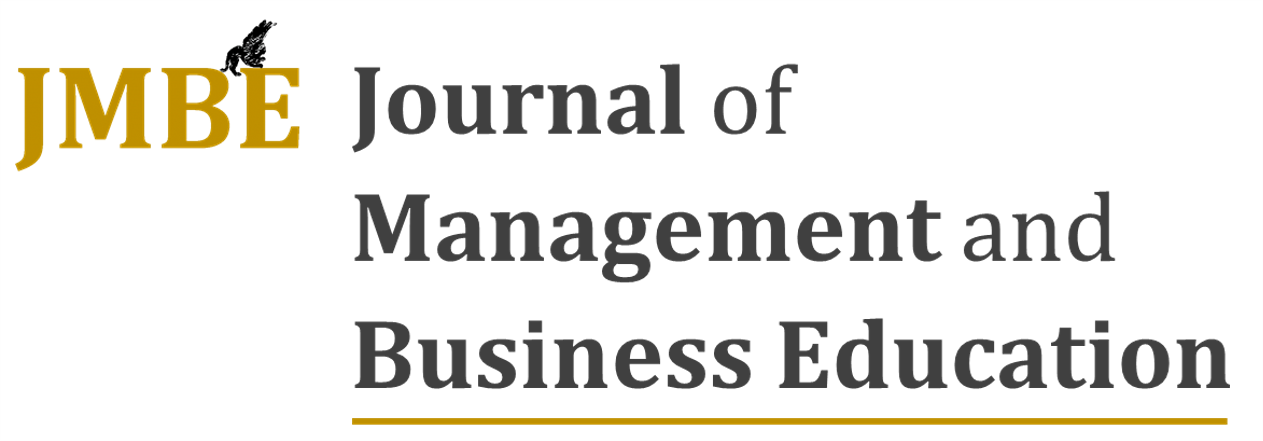Assessing students competencies and learning in master thesis projects: towards an integrated evaluation approach
DOI:
https://doi.org/10.35564/jmbe.2019.0002Keywords:
final master thesis, generic skills, assessment, learning evaluation, higher educationAbstract
This study is conducted in the context of a Spanish Business School, applied to different Master degree programme. The objective is focused on the identification of which generic skills are needed and developed in a Final master thesis (FMT). Therefore, this study is double folded. On the one hand we use a survey to ask the students which generic skills they consider that should be needed and developed in their FMT, and on the other, we explore the elaboration process as well as validation process of tools to gather information and evidences in order to assess the final results of the FMT being submitted by the students at the end of their learning journey. Specifically, this paper develops the preliminary results approach to the identification of the competencies from the student’s perspective.
Downloads
References
Achcaoucaou, F.; Guitart-Tarrés, L.; Miravitlles-Matamoros, P.; Núñez-Carballosa, A.; Bernardo, M. & Bikfalvi, A. (2012). Competence Assessment in Higher Education: A Dynamic Approach. Human Factors and Ergonomics in Manufacturing & Service Industries, 24(4), 454-467.
https://doi.org/10.1002/hfm.20394
ANECA (2005). Libro Blanco Título de Grado en Economía y Empresa. Madrid: ANECA
AQU (2013). Guía para la acreditación de las titulaciones oficiales de grado y Máster. Retrieved on 13/05/2016 from: http://www.aqu.cat/doc/doc_37943576_1.pdf
Azevedo, A.; Apfelthaler, G.; & Hurst, D. (2012) Competency development in business graduates: An industry-driven approach for examining the alignment of undergraduate business education with industry requirements. International Journal of Management Education, 10(1), 12-28.
https://doi.org/10.1016/j.ijme.2012.02.002
Ciudad Gómez, A. & Valverde Berrocoso, J. (2012). Design of a competency-based assessment model in the field of accounting. Contemporary issues in education research. 5(5), 343-348.
https://doi.org/10.19030/cier.v5i5.7466
Diez-Martin, F. (2018). Dónde estamos: Una introducción a la educación en los negocios. Journal of Management and Business Education, 1(1), 1-10.
https://doi.org/10.35564/jmbe.2018.0001
Domínguez-CC, M.; Revilla-Camacho, M.A.; & Cossío-Silva, F.J. (2018). Adquisición de competencias y aprendizaje en colaboración con las empresas. Journal of Management and Business Education, 1(1), 11-27
https://doi.org/10.35564/jmbe.2018.0002
Drennan, J. & Clarke, M. (2009) Coursework master's programmes: the student's experience of research and research supervision. Studies in Higher Education, 34(5), 483-500.
https://doi.org/10.1080/03075070802597150
European Commision's homepage for the Bologna Process, http://ec.europa.eu/education/policies/educ/bologna/ bologna en.html, July 2008
Feldt, R., Höst, M., & Lüders, F. (2009, February). Generic skills in software engineering master thesis projects: Towards rubric-based evaluation. In 2009 22nd Conference on Software Engineering Education and Training, 12-15. IEEE.
https://doi.org/10.1109/CSEET.2009.54
Garcia-Garcia, M.J.; Gonzalez-Garcia, C.; Dorado, G.A. & Fernandez, L.J. (2011). Development and assessment of the competence creativity applied to technical drawing. World Academy of Science, Engineering and Technology. 77, 997-1001.
Guitart-Tarrés et al. (2014). Students competences in Business Administration subjects. International Journal on Advances in Education Research. 1(2), 1-20.
Helsinki Conference on Master-Level Degrees (2003). Helsinki, 14-15 March 2003.
Katz, P. (2005). Retrieving the master's degree from the dustbin of history: A report for the members of the American Historical Association. Washington, DC: American Historical Association.
Marin-Garcia, J.A.; Garcia-Sabater, J.P.; Miralles, C. & Rodríguez Villalobos, A. (2008). Profile and competences of Spanish industrial engineers in the European Higher Education Area (EHEA). Journal of Industrial Engineering and Management. 1(2), 269- 284.
https://doi.org/10.3926/jiem.2008.v1n2.p269-284
Mateo, J.; Escofet, A.; Martínez-Olmo, F.; Ventura, J. & Vlachopoulos, D. (2012). Evaluation tools in the European Higher Education Area (EHEA): an assessment for evaluating the competence of the Final Year Project in the social sciences. European Journal of Education. 47(3), 435-447.
https://doi.org/10.1111/j.1465-3435.2012.01536.x
Murray, J. & Hammons, J. (1995). Delphi. A versatile methodology for conducting qualitative research. Review of Higher Education, 18 (4), 423-436.
https://doi.org/10.1353/rhe.1995.0008
Sedgwick, M.; Kellett, P.; Kalischuck, R.G. (2014). Exploring the acquisition of entry-to-practice competencies by second-degree nursing students during a preceptorship experience. Nurse Education Today. 34(3), 421-7.
https://doi.org/10.1016/j.nedt.2013.04.012
Tuning General Brochure (2006). Introduction to Tuning, European Union Directorate of Education and Culture, Brussels, Tech. Rep.
Tuning Educational Structures in Europe I (2003). Final Report. Pilot Project - Phase 1. Retrieved on 15/04/2016 from http://www.unideusto.org/tuningeu/competences.html
Downloads
Published
How to Cite
Issue
Section
License
Copyright (c) 2023 Journal of Management and Business Education

This work is licensed under a Creative Commons Attribution-NonCommercial-ShareAlike 4.0 International License.
License terms at: https://creativecommons.org/licenses/by-nc/4.0/legalcode




